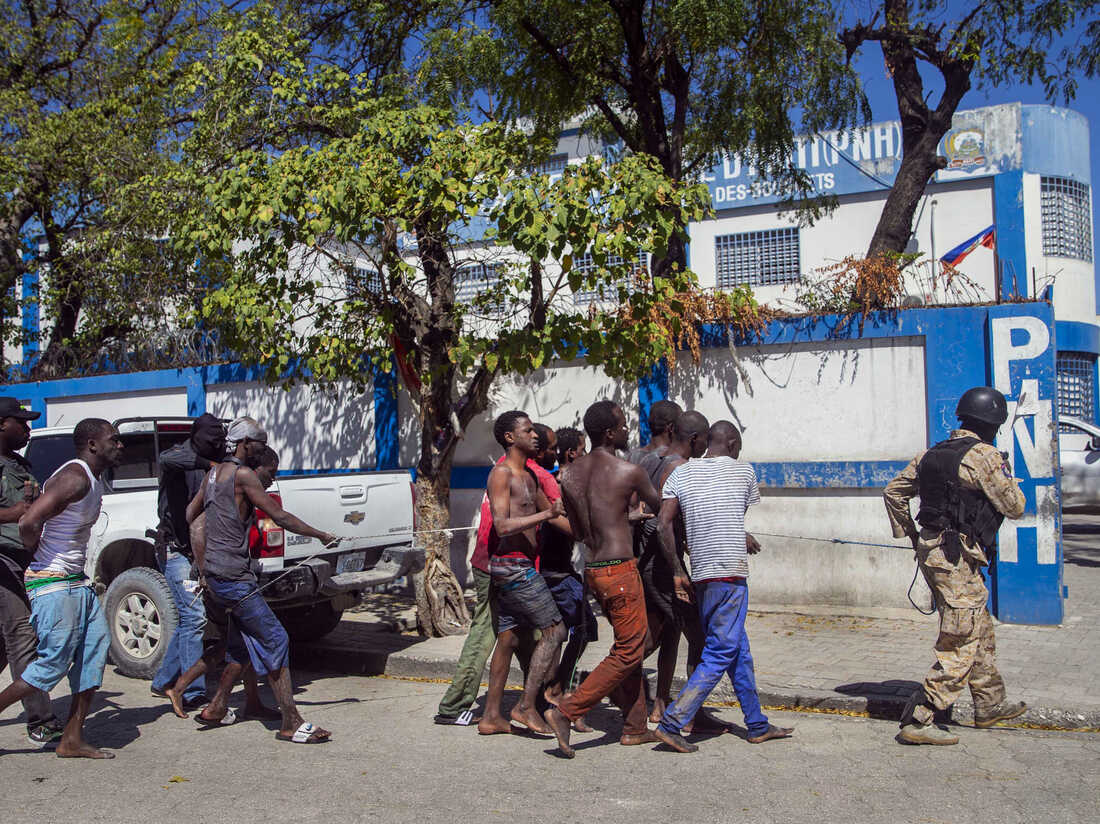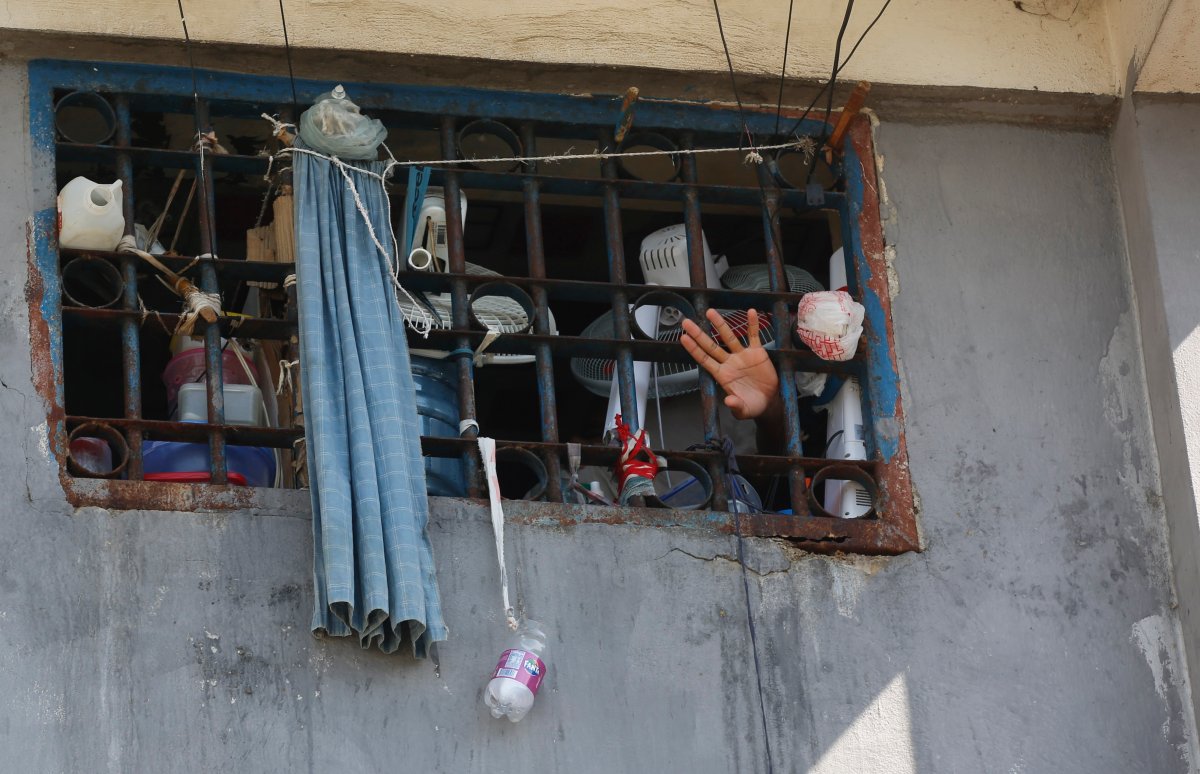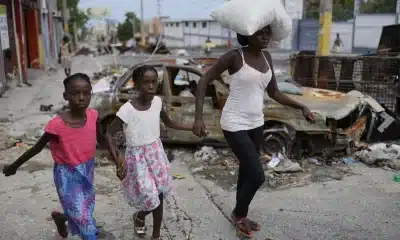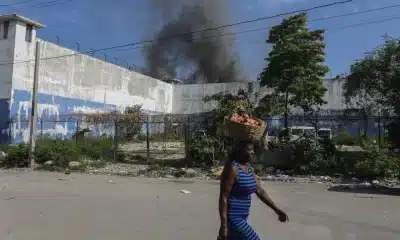News
Haiti Gangs Torch Police Stations As PM’s Future Hangs In Balance
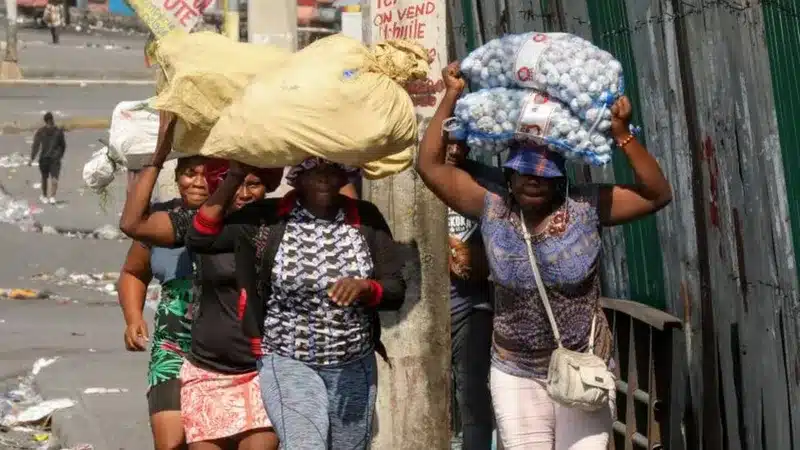
Gangs seeking the removal of Haitian Prime Minister Ariel Henry have set fire to police stations in the city of Port-au-Prince.
According to local media, the police station in the bustling Salomon market is the most recent target.
The three-day state of emergency has now been extended for a month.
When Mr Henry left for a regional summit last week, the city’s violent gangs increased their attacks.
Haiti Gangs Torch Police Stations As PM’s Future Hangs In Balance
The turmoil has disrupted flight traffic, preventing his return.
On Tuesday, Mr Henry attempted to fly back to Port-au-Prince but ended up in Puerto Rico, a US territory.
He was unable to land in the Haitian capital because the international airport was closed while the military fought gunmen’s attempts to take it.
Civil aviation authorities in the neighbouring Dominican Republic similarly turned the prime minister’s plane away, claiming they had not been given the proper flight plan.
Mr Henry has not made any public pronouncements since his journey to Kenya, where he attempted to rescue a pact for the African country to head a multinational army to help restore order in Haiti.
The two leaders inked a reciprocal agreement that allows 2,000 Kenyan police personnel to be transported to Haiti, but a Kenyan opposition legislator has said he will challenge the accord in court.
Meanwhile, numerous Kenyan police officers who had volunteered for the deployment have decided not to go due to safety concerns.
One officer told the BBC that there were no clear guidelines for how they were expected to work while on the assignment. Another said that some of his squad members had withdrawn in response to the recent increase in violence.
Haiti Gangs Torch Police Stations As PM’s Future Hangs In Balance
Gangs in Port-au-Prince have launched a series of coordinated attacks in the absence of Prime Minister Ariel Henry.
Among their priorities were the airport, which they wanted to seize to prevent Mr Henry from returning, and two jails, from which thousands of convicts were released.
According to a tally maintained by the National Human Rights Defense Network (RNDDH), they have also set fire to the Croix-des-Bouquets peace court and looted or burnt around 20 other structures.
At least six police officers have been slain, and the National Police Academy has also been destroyed.
Following the storming of the National Penitentiary, numerous prisoners’ bodies were left in the streets.
The violence exacerbated Haiti’s humanitarian problems.
Aid organizations believe that around 15,000 individuals have abandoned their homes in the last week.
Ulrika Richardson, the UN Humanitarian Coordinator in Haiti, told BBC Newshour that the situation was “extremely dire and very alarming”.
“We have big parts of the capital paralyzed: schools are closed, many hospitals have had to close, either because of a lack of equipment or simply that staff cannot get to work,” she said.
Haiti Gangs Torch Police Stations As PM’s Future Hangs In Balance
Aside from the removal of Mr Henry, the gangs have yet to state their goals.
Jimmy “Barbecue” Chérizier, a former police officer who leads a gang alliance known as G9, has claimed that if Mr Henry does not stand down, there will be a “civil war” that could end in “genocide”.
Caribbean countries and the United States have asked Mr Henry to take steps to “finalize a political accord”.
Irfaan Ali, Guyana’s president and current chair of the regional group Caricom, stated that “a political solution to anchor any stabilization of security and humanitarian efforts” was required.
In a video message, Mr Ali stated that Caricom had been unable “to reach any form of consensus between stakeholders in Haiti” despite round-the-clock efforts to get the government and key figures in the opposition, private sector, civil society, and religious organizations to agree on a course of action.
SOURCE – (BBC)
News
Britain Must Be Ready for War in 3 Years, Warns New Army Chief

The new head of the Army has stated that Britain must be prepared to fight a war within three years.
Gen Sir Roland Walker has issued a warning about a variety of risks in what he calls a “increasingly volatile” environment.
However, he stated that war was not inevitable and that the Army had “just enough time” to prepare to prevent conflict.
He stated that the Army’s fighting capacity would be doubled by 2027 and tripled by the end of the decade.
Gen Walker warned that the Britain was under threat from a “axis of upheaval” in his first speech as Prime Minister on Tuesday.
Among the primary concerns confronting the Britain in the next years, as noted by the general in a briefing, is an enraged Russia, which may seek vengeance on the West for helping Ukraine, regardless of who wins the war.
He stated: “It doesn’t matter how it finishes. I believe Russia will emerge from it weaker objectively – or completely – but still very, very dangerous and seeking some form of retaliation for what we have done to assist Ukraine.”
Britain’s Government Defence Review and Military Challenges
He also warned that China was determined to retake Taiwan, and Iran was likely to seek nuclear weapons.
He stated that the threats they posed may become particularly acute in the next three years, and that these countries had formed a “mutual transactional relationship” since the war in Ukraine, sharing weaponry and technology.
However, he stated that the path to conflict was not “inexorable” if the UK re-established credible land troops to assist its deterrent strategy for avoiding war.
In his speech, he described his force of slightly over 70,000 regular troops as a “medium-sized army” and made no direct call for additional resources or men.
However, he pushed the British Army to adapt swiftly, focussing on technology such as artificial intelligence and weaponry rather than numbers.
His ultimate goal is for the Army to be capable of destroying an opponent three times its size.
This would entail firing quicker and farther, he said, aided by lessons learnt from the Ukraine war.
The general’s speech at the Royal United Services Institute land warfare conference comes only one week after the government began a “root and branch” defence review to “take a fresh look” at the challenges facing the armed services.
Defence Secretary John Healey launched the assessment, describing the existing status of the armed forces as “hollowed-out” and stating that “procurement waste and neglected morale cannot continue”.
According to the most recent Ministry of Defence (MoD) numbers from April 2024, the Britain’s regular Army forces total 75,325 troops (excluding Gurkhas and volunteers).
That figure has been declining in recent years, as recruiting has failed to match retention. The previous Conservative administration lowered the planned headcount from 82,000 to 72,500 by 2025.
Members of the NATO military alliance have agreed to spend at least 2% of GDP on defence by 2024, but several countries are unlikely to fulfil this goal.
The Britain presently spends 2.3% of its GDP on defence. Prime Minister Sir Keir Starmer has previously stated that the defence review will include a “roadmap” for increasing this to 2.5%, however he has yet to provide a date for this promise.
Source: BBC
News
Katie Ledecky Hopes For Clean Races At Paris Olympics In The Aftermath Of The Chinese Doping Scandal

PARIS — Katie Ledecky is looking for clean Olympic races. On Wednesday, Hope had pretty much reached her limit.
The American swimmer hopes to add to her six gold medals as she competes in the 400, 800, and 1,500 meters at the Paris Games. Her program starts with the heavy 400 on Saturday, featuring Ariarne Titmus and Summer McIntosh.

Katie Ledecky | ESPN Image
Katie Ledecky Hopes For Clean Races At Paris Olympics In The Aftermath Of The Chinese Doping Scandal
The 27-year-old Katie is competing in her fourth Summer Olympics, but the first since a doping scandal involving almost two dozen Chinese swimmers who tested positive for a banned chemical before the Tokyo Games — yet were permitted to compete with no consequences. The controversy has raised serious worries regarding the effectiveness of anti-doping initiatives.

Katie Ledecky | Vogue Image
“I hope everyone here is going to be competing clean this week,” Ledecky claimed. “But what truly counts is, were they training cleanly? Hopefully this has been the case. Hopefully, there has been worldwide testing.”
The International Olympic Committee has expressed concern over the ongoing US investigation into possible doping by Chinese swimmers. While awarding the 2034 Winter Olympics to Salt Lake City on Wednesday, the IOC urged Utah officials to do whatever they could to stop the FBI investigation.
“I think everyone’s heard what the athletes think,” Katie added. “They seek transparency. They want more answers to the remaining questions. At this point, we are here to race. We are going to race whoever is in the lane next to us.
“We are not paid to conduct the tests, so we trust those who follow their regulations. That applies both today and in the future.

Katie Ledecky | ESPN Image
Katie Ledecky Hopes For Clean Races At Paris Olympics In The Aftermath Of The Chinese Doping Scandal
SOURCE | AP
News
London Heatwave Alert: High Temperatures Set to Soar to 29C Next Week

As the summer holidays begin, London may experience an official heatwave with temperatures reaching up to 29 degrees Celsius.
The Met Office predicts a long period of sunny and dry weather for London after a soggy spring and summer.
After a cloudy day on Saturday, temperatures are expected to reach 27C on Sunday, with lots of sunlight.
On Monday and Tuesday, temperatures are forecast to peak at 29 degrees Celsius. Monday is forecast to offer more sunlight, while Tuesday may see some gloomy weather.
Temperatures are expected to remain in the high 20s next week, with lows of approximately 18C.
According to the Met Office, a heatwave is “an extended period of hot weather relative to the expected conditions of the area at that time of year, which may be accompanied by high humidity.”
In the United Kingdom, a heatwave is proclaimed when daily temperatures meet or surpass a certain level for at least three consecutive days.
In London, the heatwave threshold is 28 degrees Celsius.
The Met Office reported that the UK is experiencing hotter and wetter weather on average due to climate change.
The UK experienced its warmest May and April on record this year, despite damp and dismal conditions in many areas.
According to the Met Office’s State Of The UK Climate 2023 report published on Thursday, the UK experienced historic levels of extreme weather last year.
In the United Kingdom, 2023 was the second warmest year on record, bringing storms, flooding, strong heatwaves, and rising sea levels; only 2022 was warmer.
It was 0.8°C higher than the average from 1991 to 2020, and 1.66°C higher than the 1961 to 1990 average.
However, 2023 will be a “cool year” in comparison to 2100, based on the planet’s warming trajectory.
The government’s plan to adapt to the hazards presented by climate change is currently being challenged in the High Court by campaigners who allege the Tory administration’s July 2023 National Adaptation Programme (NAP) fails to adequately address 61 concerns.
Source: The Standard
-
World2 weeks ago
Former President Trump Survives Being Shot at Pennsylvania Rally
-
Tech4 weeks ago
Huawei Launches 5G-A Pioneers Program at MWC Shanghai 2024: Paving the Way for a Connected Future
-
Tech4 weeks ago
ChatGPT Answers Undiscovered Questions and Outperforms Students.
-
Sports4 weeks ago
NBA Draft: Kyle Filipowski Withdraws Unexpectedly From The First Round
-
News4 weeks ago
US Supreme Court Rejects Drug Deal that Protects the Sackler Family
-
Health4 weeks ago
US Health Agency Issues Dengue Virus Infection Warning


